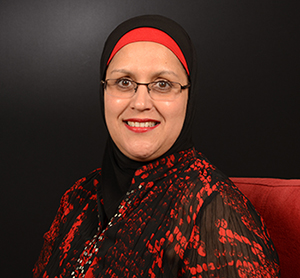

Prof Hasina Banu Ebrahim, Joint incumbent: UNESCO Chair in Early Childhood Education, Care and Development & NRF C1-rated researcher: College of Education, Unisa
Prof Hasina Banu Ebrahim of Unisa’s College of Education (CEDU) specialises in early childhood care and education, and acknowledges that the specialisation is significant for South Africa and the rest of Africa as there are very few rated black full professors in the field. She received her C1 rating in 2020 and is now pursuing a path to becoming a B-rated social scientist for early childhood.
After 16 years in early schooling, Ebrahim transitioned from being a Foundation Phase Head of Department into a Discipline Head for Teacher Training in Early Childhood in Higher Education. When she studied towards her PhD, which explored the constructions of early childhood and raised many questions about young children and practice with and for them, she had a dream of becoming a rated researcher. In 2014, she obtained a C3 rating and this motivated her to continue to deepen research in her thematic area. She worked strategically and began to get recognised internationally. She then did it again and this time, was elevated to a C1 rating.
All her reviewers for the C1 application were firmly convinced that she was an established researcher with some indicating that she attained considerable recognition for the quality and impact of her recent research outputs. The reviewers also recognised the importance of her niche area and the value of growing the knowledge base in the field.
"Being an established researcher with growing international recognition comes with a great deal of responsibility for self-development through the capacity development of others. To grow my niche area, I have inserted myself into mentorship platforms. This is enabled through being a chair of mentoring at CEDU and being the driver of research support in the Department of Early Childhood Education."
Ebrahim has produced numerous peer-reviewed publications to generate knowledge on dominance, marginalisation and contextualisation. Her latest research drives the theme early childhood at the margins with special reference to policy, practice and teacher development. Her book on Early childhood education for Muslim children is an empirical study in KwaZulu-Natal and the Western Cape provinces. It shows the complexities in early education when religion, culture, parental expectations and secularism intersect.
In her co-edited book Early childhood care and education at the margins: African perspectives on birth to three, an asset-based approach affirms the marginalised voices of early childhood stakeholders using different country experiences on the continent. "My publication track record earned me the position of the UNESCO Co-chair for Early Education, Care and Development. I was also commissioned to develop policies and became part of winning teams for projects in early childhood."
Ebrahim has mentored emerging researchers in South Africa and in ten other countries in Africa. She acknowledges that being in academia has allowed her to push the boundaries of knowledge where the context of early childhood matters. She says she has positioned herself as a thought leader who denaturalises early childhood as just a phase of development. Through her research, she shows the social, political, cultural, economic and religious dimensions that are often ignored.
Her forthcoming books in 2020/21 relate to professional development and early childhood practice from the perspective of realities in different situations and the positionality of thinking professionals in the early years.
Ebrahim won the Unisa 2017 Women in Research Leadership Award. In 2018, she was the first runner up in the South African Women in Science Award.
* By Nancy Legodi, Acting Journalist, Department of Institutional Advancement
Publish date: 2020-06-03 00:00:00.0